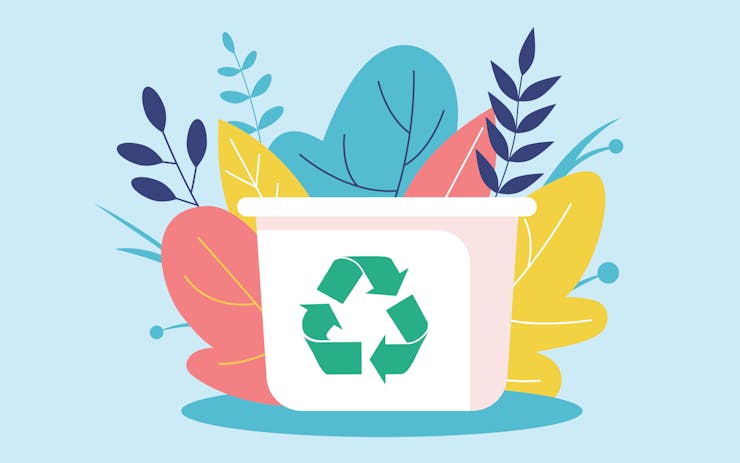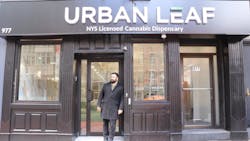After a few years of prolific vaping, generous edible consumption, and the dawn of the individually packed preroll, the plastic has really piled up from the cannabis industry. Though it’s easy to point the finger at regulations for child-resistant packaging as the major culprit, limited innovation hasn’t helped. Until the fossil fuel derivative becomes fully renewable, plastic waste is the ultimate buzzkill.
The lack of sustainability in the cannabis sector has been apparent for a few years now. Developing vapes without lithium batteries and creating fully childproof packaging still isn’t universal. Real changes on a legislative and industrial level must be made or the needle won’t move much, and the Great Pacific Garbage Patch will continue to grow if we do nothing.
That’s why we’re checking out some cannabis people and programs who are taking action, so you can take care of that garbage from the great weed in your stash box.
Loyalty program for plastic recycling
Maryam Mirnatenghi, CEO of Canna West Seattle, has been sparking some change via a recycling program she dubs Canna Collect. Across the street from their West Seattle cannabis dispensary is sister spot The Culture Shop, which hosts their recycling drop and sells gifts and CBD care products.
Mirnatenghi thinks the main challenge is getting consumers to stop seeing plastic as normal. “Step one is to help people see there is a big problem with packaging waste in the cannabis industry and encourage everyone involved to make choices that will chip away at this monumental problem,” she said.
Whether or not you bought your cannabis at Canna West, you can recycle packaging there. They run a loyalty program called Baker Points, which can be earned through recycling. Providing people with a place to drop Mylar bags, cardboard, and glass, while collecting points for perks is a pretty great motivator.
“It is about simple responsibility,” she said. “Some cannabis consumers might feel nervous about recycling their cannabis and CBD packaging on the curbside for fear of judgment from the neighbors or the waste [collection] employees. We don’t judge.”
Converting plastic into delivery fuel
This year at iconic canna-gathering Hall of Flowers, CannaCraft sponsored a packaging collection system that could make a big impact in the supply chain’s energy use.
They partnered with Resynergi, a Sonoma County-based waste solutions company, to turn waste into diesel fuel for Canna Craft delivery vehicles. As a large operator in California, CannaCraft hopes to set an example by collecting waste from big production facilities.
Dennis Hunter, CannaCraft’s co-founder and chief strategy and innovation officer, is a lifetime cultivator who wants to look past the initial years of the legal market to a greener future for packaging.
After their Hall of Flowers collection campaign, they ended up with 150 pounds of plastic packaging, a pretty sizeable amount—enough to fill a small moving truck.
Recycling is quite in demand among cannabis pros. “We are in the process of rolling out a more robust collection program in dispensaries and at events, and we are already receiving weekly, if not daily, inquiries from partners wanting to participate,” he said.
According to Hunter, most of the required child-resistant packaging is immediately thrown away, sometimes right outside shops. By using Resynergi to process their plastic, they are solving both the issues of waste and of burning fossil fuels—a two-pronged solution to environmental damage caused by current cannabis practices.
No one wants kiddos to have access to cannabis, and it’s easy to understand why you would want to protect them from candy-like edibles, but Hunter thinks that not all products are an immediate risk to children.
“For things like flower or vape cartridges [the two top-selling products in California] that do not pose a threat for accidental ingestion, there should be a more logical approach to packaging requirements,” said Hunter. “We are in discussions with legislators about the issue, and we are hopeful that we can arrive at a solution that makes sense for both sides.”
Tech needs to catch up to green practices
Pete Pietrangeli, CEO of vape company Acme, thinks overall policies of states like California have made it difficult to have a truly sustainable product by making them prohibitively expensive for both producer and consumer.
“We see a lot of up-charge trickling down at the consumer level for their environmentally friendly packaging, and it makes it harder for people to choose the greener option,” he said.
California is known for its environmentally progressive values, but soon after the plastic bag ban in 2018, recreational cannabis was slapped with regulations that meant piles of plastic and no reuse allowed.
No matter what a brand’s intentions, regulations are a challenge, especially in California, which is very strict about child-resistant packaging and also reusing any materials that have touched cannabis, he said.
In the case of vape parts, Pietrangeli said they instruct shops who buy Acme vapes to collect spent carts for processing at a hazardous waste station, until there is change at the government level or more sustainable tech options come about.
“There are great minds at work with vetted concepts ready to implement,” Pietrangeli said. “Sanitizing stations to process cannabis plastic and cannabis e-waste for reuse are concepts that I’m anxious to see put into place.”
In the rush to get cannabis in the hands of consumers and keep it out of those of children, state governments have circumvented the status quo around plastics and made it very hard to opt out. Once change happens at the state and federal level, packaging innovations will hopefully have a chance to take root in the cannabis industry.






